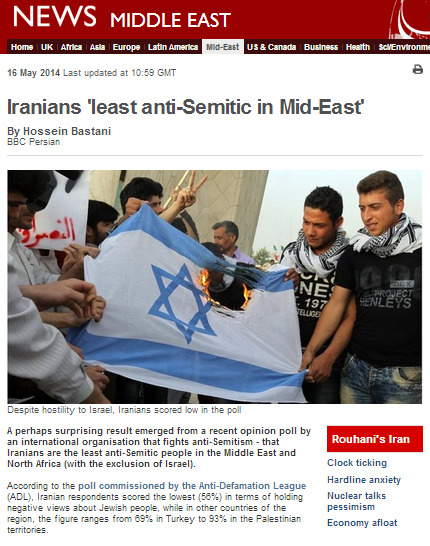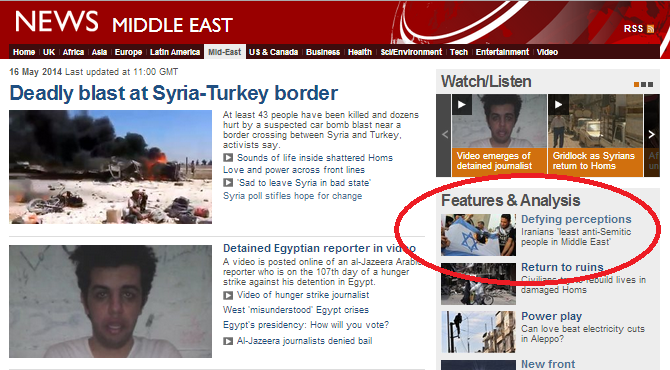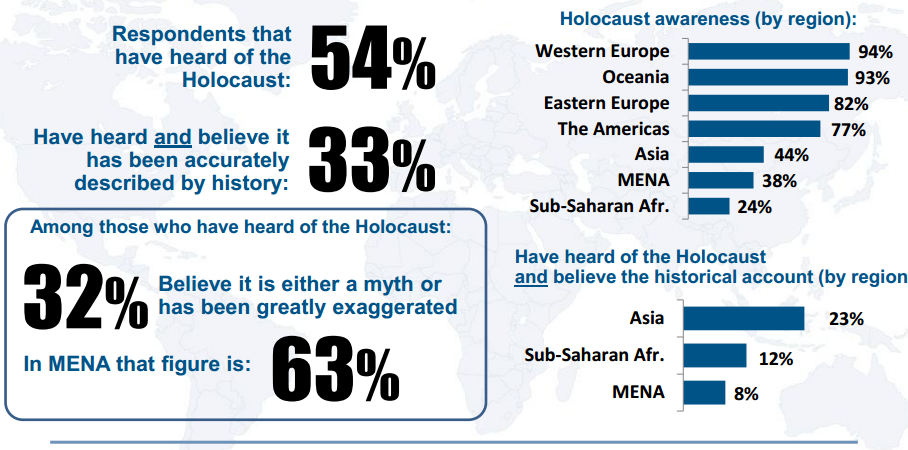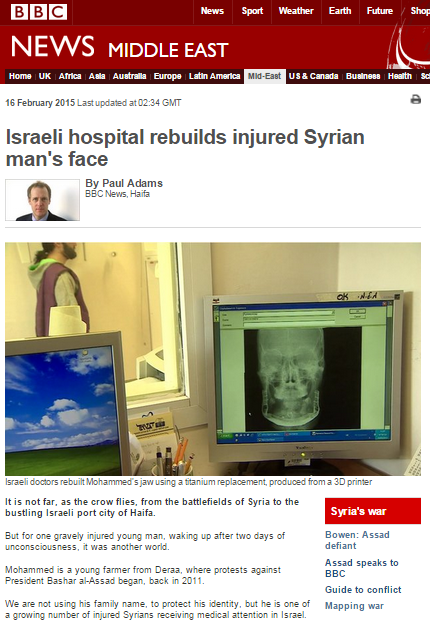On May 13th the Anti-Defamation League (ADL) released the results of a worldwide poll on antisemitism. Readers can view the executive summary here and the interactive site here.
Three days later, BBC Persian’s Hossein Bastani came up with an interesting take on one aspect of the poll’s results which was promoted to visitors to the BBC News website’s Middle East page under the title “Defying perceptions: Iranians ‘least anti-Semitic people in Middle East'”.
Bastani’s article opens:
“A perhaps surprising result emerged from a recent opinion poll by an international organisation that fights anti-Semitism – that Iranians are the least anti-Semitic people in the Middle East and North Africa (with the exclusion of Israel).
According to the poll commissioned by the Anti-Defamation League (ADL), Iranian respondents scored the lowest (56%) in terms of holding negative views about Jewish people, while in other countries of the region, the figure ranges from 69% in Turkey to 93% in the Palestinian territories.”
What Bastani neglects to clarify to readers is that the Middle East and North Africa (MENA) emerged as the most antisemitic region in the world according to the ADL poll, so whilst Iran did indeed poll lowest in that region with ‘only’ 56% holding antisemitic attitudes, it still came much higher than the average in any other region of the world.
Bastani then devotes five paragraphs to explaining to readers that “Iranian conservatives” do use what he terms “anti-Jewish propaganda” and, in line with previous BBC coverage (see ‘related articles’ below), implies a difference of attitude between the current Iranian president and his predecessor. In his next four paragraphs Bastani deflects audience attention from the supposed subject matter of his article – a poll on antisemitism – to the topic of criticism of the Israeli government.
“On the other hand, among those Iranians who are critical of the ruling conservatives, there are many who hold negative views of the Israeli government for different reasons.
For instance, they disagree with Israel’s policies towards the Palestinians and oppose its stance on Iran’s nuclear programme.”
Bastani’s concludes that the poll shows that “a large part” (actually less than half: 44%) of the Iranian population is not influenced by the attitudes of its conservative leaders. However, he does not make any attempt to seriously address the issue of the 56% which, according to his theory, is influenced by those attitudes.
“Yet despite such criticisms, the recent ADL poll shows that a large part of Iran’s population is not influenced by the negative narratives presented by the country’s conservatives about Jewish people.
One may even conclude that because of their distrust of the ruling conservatives, many Iranians may simply reject “whatever” the regime says, including its propaganda regarding Jews.”
Finally, Bastani cherry-picks one particular poll question result in order to drive home a take-away point.
“Perhaps the most significant aspect of the recent opinion poll is the very low percentage of respondents in Iran who agree with the statement that “Jews still talk too much about what happened to them in the Holocaust.”
In the Islamic Republic of Iran, where the ruling conservatives have been denying the Holocaust for a long time, only 18% of the respondents believe that the above statement is “probably true”.
This figure is particularly noteworthy when compared to 22% who agreed with the same statement in the United States.”
He neglects to inform readers however that whereas in the Americas, 77% of people have heard of the Holocaust, in the MENA region only 38% have heard of it and only 8% believe the historical account.
The actual poll data for Iran shows that 30% of Iranians have heard of the Holocaust, 67% have not and 3% do not know. Of those who replied that they had heard of the Holocaust, 6% think it is a myth and did not happen, 57% think it did happen but that the number of Jews who died has been greatly exaggerated, 19% think that the Holocaust happened and that the historic accounts are fair and 18% don’t know.
By contrast, in the United States, 89% of those polled had heard of the Holocaust and 10% had not. Of those who have heard of the Holocaust, 1% think it is a myth and did not happen, 6% think it did happen but that the number of Jews who died has been greatly exaggerated, 89% think that the Holocaust happened and that the historic accounts are fair and 4% don’t know.
Bastani’s transparent attempt to paint Iran as a country with more liberal attitudes towards the Holocaust than the United States is therefore inaccurate, misleading and redundant.
Related Articles:
Bang goes the BBC diplomatic correspondent’s theory of ‘moderated’ Iranian Holocaust denial
BBC’s Marcus promotes ‘moderated’ Iranian Holocaust denial
BBC takes a stroll down the tabloid journalism side of the street
BBC presents airbrushed picture of Rouhani NBC interview
BBC continues to portray a ‘moderate’ Iranian regime







